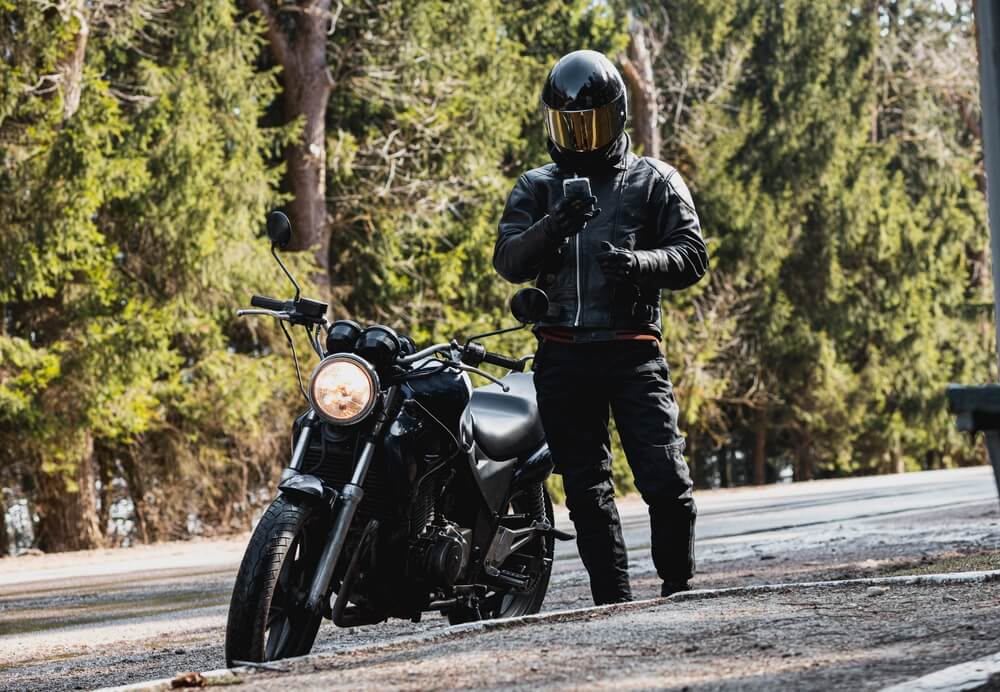If you’re like me, the Gwyneth Paltrow ski trial didn’t make much of a blip in your daily life. To me, it felt like a media spectacle meant more as fodder for celebrity fans than for actual legal importance. However, there was one aspect of Paltrow’s case that definitely caught my eye.
Her lawyer used the plaintiff’s own social media posts against him to prove that he was not hurt in the crash. This is exactly what I’ve been warning my clients about for years! Do not post anything about your motorcycle crash on social media.
Now, in the end, the plaintiff, Terry Sanderson, was found 100% at fault in the crash and, therefore, Paltrow did not owe him anything. However, if they had found Paltrow at fault to even a small percentage, Sanderson’s own social media posts would have been even more damning.
Sanderson was trying to prove that the crash had changed his life, turning him into “a different person,” and “a crippled vet.” But Paltrow’s lawyer found ample evidence otherwise in Sanderson’s own social posts.
Here’s an excerpt from a recent New York Times op-ed about the trial:
“This is a picture of you and your girlfriend, smiling big, right?”
“Smile, camera, yup,” Sanderson replied.
And then, the deluge:
Was this, Owens asked, Sanderson hiking with his girlfriend? Was this him taking a picture of a moose? Was this him, looking happy? Was this him hiking again, and smiling? With a cool backpack containing water? Scuba diving? At an auto show in Germany? A shooting range? BMX bike show? Was this Sanderson on a boat ride along canals in the Netherlands? Did he do bus tours? Or go to Morocco? Twice? Did he go to this museum in Marrakesh? Was this him at a rock concert? At a ski resort? Out with drinking buddies? At an exhibit? Feeling happy? Looking fit and happy? Was this him “doing yoga, or momba, or what?”
“It’s Zumba,” Sanderson corrected. And yes.
Sanderson destroyed his own case with social media posts about his amazing life.
Don’t Post Anything on Social Media After a Motorcycle Crash

Now, I don’t know if Sanderson suffered a concussion. I know that concussions can be deceptive and scary conditions. In the end, the jury found Sanderson at fault, so the question about his concussion symptoms was moot.
But that is a risk you do not want to take after a motorcycle crash. Motorcycle accidents generally tend to involve severe injuries and very high medical bills. If the other driver was at-fault, you do not want to do anything to damage your case by posting anything on your social media accounts.
Insurance companies and lawyers often use social media as evidence, and anything you post can be used against you. For example, if you post a picture of yourself smiling with friends after a motorcycle accident, it could be used to argue that your injuries aren’t as severe as you claim.
Here is a list of things you should NOT post on social media after a motorcycle crash:
-
- Photos and videos from the scene of the crash: While I tell people all the time to document the scene of a motorcycle crash using their smart phones, I never want those photos or videos to end up on social media. You should keep those locked up and share them only with your lawyer.
-
- Statements about whose fault it was: Motorcycle crashes get the adrenaline going! In the moment, I have seen people do and say crazy things that they regret later.While you are documenting the scene of a crash, refrain from discussing how it happened during a video. Any video taken at the scene of the crash will be used as evidence. Often, victims of motorcycle crashes are unclear as to what happened to them. They recall things that witnesses later prove never happened. It is best to take some time after a crash, hire a motorcycle accident lawyer, and don’t make any statements about the motorcycle crash.Never post a video with your thoughts about how it may or may not have happened.
-
- Updates on your injuries or medical treatments: We have entered the era of over-sharing. People feel like events haven’t fully happened unless they post them on the internet for all to see. But please do not post any pictures or updates on your injuries or medical treatments after a motorcycle crash.Anything you post will be open to interpretation by the other driver’s insurance company and, trust me, they are not going to interpret things the way you do. Don’t give them information that they can twist against you.
-
- Posts about your daily activities: After reading about Terry Sanderson’s prolific posts in his case against Gwyneth Paltrow, this one should now be obvious.You may have good days when you’re feeling great and you want the world to know. But don’t post anything. Terry Sanderson may have been dealing with debilitating pain and memory loss from his concussion, but all those smiling pictures in glamorous locations completely destroyed his credibility.
-
- Check-ins and location tags: If you’re going out to dinner, heading to a concert, even taking your kids to school, do not “check in” using social posts and tags. All that activity may make insurance companies wonder if you’re actually as injured as you claim.
While I’m at it, I should also mention that your entire social media history could be used against you in a motorcycle crash case, not just posts from after the accident.
For example, I know of a case in which a man posted a video of himself doing a wheelie on his motorcycle shortly before he was involved in an accident. The video was used as evidence against him in court, making him look like an irresponsible rider.
In a nutshell: After a motorcycle crash, you should go dark on all social media. At the very least, hire a motorcycle attorney to assess your case and advise you on any posts you think you’d like to share.
Other Reasons to Limit Your Social Posts
 Since we’re on the topic, I thought I’d share a few more reasons why you should never post on social media after a motorcycle crash. Believe it or not, posting about your accident on social media can also negatively impact your career.
Since we’re on the topic, I thought I’d share a few more reasons why you should never post on social media after a motorcycle crash. Believe it or not, posting about your accident on social media can also negatively impact your career.
For example, if you post about the accident and the injuries you sustained, it could lead to coworkers or potential employers seeing you in a negative light. This could potentially harm your career prospects and opportunities.
Let’s say you’re a construction worker and the motorcycle accident affected your back. Do you want your co-workers and employer to think that you’re not capable of doing your job?
Additionally, posting about your accident on social media can be detrimental to your mental health. It’s easy to get caught up in the likes and comments, but social media can also be a breeding ground for negativity and criticism.
Trolls are evil and everyone has an opinion about everything. People think they are experts, and you will likely hear from folks who question your injuries and even your integrity. It’s not worth it.
After a motorcycle accident, it’s important to prioritize your mental health and take a break from social media.
Social Media After a Motorcycle Crash: Just Don’t Do It
In conclusion, posting anything about your motorcycle accident on social media is a bad idea. It can hurt your personal injury case, negatively impact your mental health, harm your reputation, and lead to legal trouble.
After an accident, it’s important to take care of yourself and your health, and that means avoiding social media.
